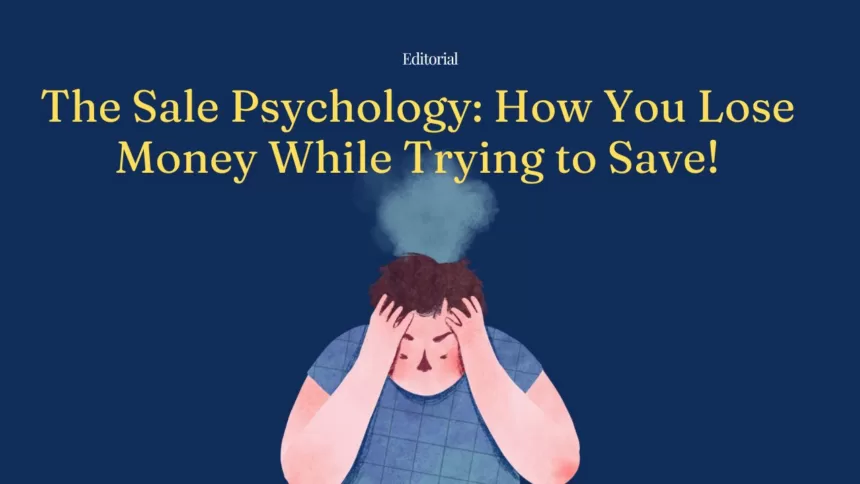India is the country of festivals and we have a festival almost every month especially during September, October and November. It starts with Ganesh Chaturthi, then Navratri, Dussehra, Deepawali. During this period, many e-Commerce platforms, malls issue sale offers where they claim to offer products at discounted rates.
And this is the trap where a common man gets trapped. Let’s discuss how the sale psychology works and how you actually lose money while trying to save.
The Sale Psychology:
Sale psychology, also known as consumer psychology, refers to the study of how individuals behave and make decisions when it comes to purchasing products or services.
Understanding the principles of sales psychology can help consumers make more informed choices, while it can also be used by businesses to influence consumer behaviour and boost sales. Here are some key concepts in sale psychology as it relates to consumers:
- Emotions Influence Buying Decisions: Many buying decisions are driven by emotions rather than rational thinking. Advertisers and marketers often use emotional appeals to connect with consumers and make them feel a certain way about a product or brand. For example, a car advertisement might emphasize the feeling of freedom and adventure to appeal to consumers’ emotions.
- Scarcity and Urgency: The perception of scarcity or a limited-time offer can create a sense of urgency in consumers. For example, phrases like “limited stock available” or “sale ends soon” can motivate people to make quick purchase decisions to avoid missing out.
- Social Proof: People tend to look to others for guidance on what to buy. Positive reviews, testimonials, and recommendations from friends or influencers can significantly impact consumer choices. Consumers often trust the experiences of others as a way to reduce the risk of making a bad purchase.
- Anchoring: Anchoring is a cognitive bias where consumers rely heavily on the first piece of information they receive when making decisions. Businesses can use this by initially presenting a higher price before revealing a discounted one, making the discounted price seem like a better deal.
- The Power of Free: The word “free” can be highly persuasive. Offering a free gift with a purchase or buy-one-get-one-free deals can encourage consumers to buy more than they initially intended.
- Loss Aversion: People are often more motivated to avoid losses than to gain equivalent rewards. Businesses can use this by emphasizing what consumers might lose if they don’t make a purchase, such as missing out on a great deal.
- Brand Loyalty: Consumers often have strong attachments to specific brands due to their past experiences, trust, or emotional connection. This loyalty can influence purchase decisions, even when other options are available.
- Price Perception: The way prices are presented can affect how consumers perceive value. For instance, pricing a product at $9.99 instead of $10 can make it seem significantly cheaper, even though it’s only a one-cent difference.
- Cognitive Dissonance: After making a purchase, consumers may experience cognitive dissonance, a feeling of discomfort or regret. Businesses can mitigate this by providing post-purchase reassurance, such as warranties or excellent customer service.
- Habitual Buying: Many purchases are habitual or routine, where consumers buy the same products repeatedly out of habit or convenience. Businesses can benefit from creating products that become part of consumers’ routines.
Understanding these psychological principles can help consumers make more informed and rational buying decisions. By recognizing the tactics businesses use to influence purchasing behaviour, consumers can be better equipped to evaluate their options and make choices that align with their needs and preferences.
How Do We Lose Money?
To understand how we lose money we’ll have to understand how e-Commerce platforms fool us. To understand this let’s see the latest Flipkart big billion days sale offer. Here Iphone 13 that was being sold at approx Rs 79000 got listed at Rs 49000. Now a person who had a budget of 38000-40000 for iPhone 11-12 or Android thought iPhone 13 is a better choice. Here
Within hours, It got “Out Of Stock.” After a day It got live again but this time the price was around INR 55000.
That’s the trick. Here, when the iPhone 13 was listed at 49000, people with a budget of 35-45k started planning to buy iPhone 13 by going out of budget but made some delay for any reason. Suddenly they saw “Out of Stock” which made them anxious and feel regret for the delay.
Now, within hours it got listed again at 55k. Here three psychological events happened that triggered and forced people to make a decision.
First one is to correct the previous mistake of delaying by paying some extra rupees. Second, Since last time It got “Out Of stock” so soon, It created a “Fear of Missing Out” or FOMO in people’s minds that if I don’t buy it now, I won’t get it at this price again.
Third thing is Price increase. When Price got increased from 49k to 55k. People thought It’ll be increasing gradually. So as soon as they saw it at 55k they hit the Buy now option and bought a phone that was 15k more than their budget.
So, tell me, Did you save 20,000 INR or lost 15,000 INR?
Do We Always Lose Money in Sales?
No, we don’t always lose money in Sales. If you buy things that you need at a discounted rate. It’s not a loss. But if you overspend in the name of Sales and buy unnecessary things that you don’t need then It’s definitely a loss for you.







